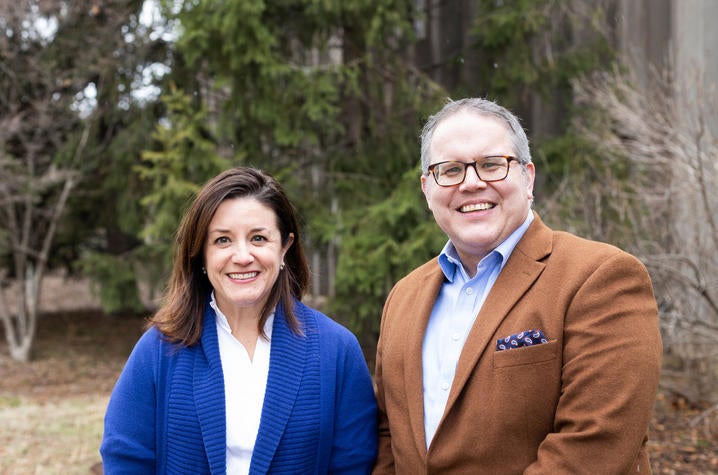UK research focuses on vaccine hesitancy in Eastern Kentucky
Published 12:35 pm Wednesday, January 25, 2023

- Kathryn Cardarelli, Ph.D., and Marc Kiviniemi, Ph.D., are co-principal investigators and researchers in the Health, Behavior & Society department at the UK College of Public Health. UK photo by Arden Barnes
NEWS RELEASE
University of Kentucky
University of Kentucky College of Public Health researchers, in collaboration with investigators from the UK College of Medicine, the UK College of Communication and Information and the Kentucky Department for Public Health, are leading a five-year, $3.7 million project to study Covid-19 vaccination hesitancy in Eastern Kentucky.
The project, called the Kentuckians Vaccinating Appalachian Communities, addresses the lower vaccination rates in Eastern Kentucky compared to other parts of the Commonwealth and the U.S. through a personalized, community-engaged approach.
Rural Appalachian Kentucky communities are particularly vulnerable to Covid-19 morbidity and mortality, and while more than half of U.S. residents have received at least one dose of the vaccine, many Kentucky counties report much lower uptake.
Marc T. Kiviniemi, Ph.D., and Kathryn M. Cardarelli, Ph.D., are co-principal investigators and researchers in the Health, Behavior & Society department at CPH. They are spearheading the multilevel approach that addresses the individual, relational and structural variables potentially contributing to vaccine hesitancy in this region of Kentucky.
“We are studying ways of simultaneously addressing the willingness to be vaccinated and vaccine accessibility, and then seeing if addressing those problems increases the portion of the populate that has received a vaccine, what we call ‘vaccine uptake,’” said Cardarelli.
K-VAC’s co-investigators include Public Health’s Angela Carman, D.P.H., Anna Hoover, Ph.D., and Emily Slade, Ph.D.; College of Medicine’s Kevin Pearce, M.D., and Jamie Sturgill, Ph.D.; Center of Excellence in Rural Health Director Fran Feltner, D.N.P.; College of Communication and Information’s Diane Francis, Ph.D.; and and Emily Messerli, D.N.P., from the Kentucky Department for Public Health’s Immunization Branch.
“Structurally, this region is rural, with many communities geographically isolated and with challenges with access to health care,” said Kiviniemi. “In addition to low socioeconomic status, and elevated levels of chronic disease, this population is placed at significant risk of complications and mortality due to Covid-19 infection. K-VAC’s vaccination interventions must use individually tailored, strong community partnerships and strategies to build trust with this community.”
“We understand that there are different attitudes and feelings about vaccinations. This collaborative, community-based research aims to build better, trustworthy communications to help populations make more informed, actionable decisions while addressing the structural barriers such as physical location, transit time, community features, access to health care, among others,” said Cardarelli.
To ensure that the project’s approach is responsive to the communities’ cultural, social, historical and economic contexts, K-VAC will be guided by a Community Advisory Board that includes members of the Kentucky River Health Consortium. KRHC members represent more than 50 organizations within K-VAC’s target population, including human services organizations, health coalitions, law enforcement agencies and managed care organizations.
“Vaccination is a critical strategy for reducing the Covid-19 overall burden and health disparities, yet vaccine intentions and uptake are unacceptably low in our partner communities in Appalachian Kentucky,” said Cardarelli. “Nationally, individuals with lower education, lower household income and those living in rural areas are more likely to express Covid-19 vaccine hesitancy. I am excited to be a part of this project, in collaboration with our project and community partners, to improve the lives of this population.”
The K-VAC project will make active use of facilities in the UK Center of Excellence in Rural Health. CERH collaborates with rural communities and other stakeholders to develop more effective approaches to rural health service delivery, engages in rural health policy research and provides medical services to residents of Appalachian Kentucky.






